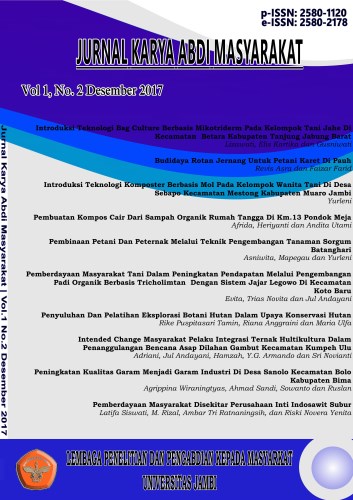PEMBERDAYAAN MASYARAKAT TANI DALAM PENINGKATAN PENDAPATAN MELALUI PENGEMBANGAN PADI ORGANIK BERBASIS TRICHOLIMTAN DENGAN SISTEM JAJAR LEGOWO DI KECAMATAN KOTO BARU
DOI:
https://doi.org/10.22437/jkam.v1i2.4289Abstract
Koto Baru merupakan salah satu kecamatan di Kota Sungai Penuh dengan mata pencaharian utama penduduknya adalah bertani. Tanaman utama yang diusahakan adalah tanaman pangan yaitu padi sawah. Luas lahan persawahan yang dimiliki adalah sekitar 90 ha dari luas wilayahnya sebesar 115 ha. Petani di wilayah ini dominan mengusahakan tanaman padi sawah yang dibudidayakan secara tradisional dengan sistem yang turun temurun dari petani terdahulu. Pelaksanaan budidayanya masih menggunakan pupuk sintetis dan pengendalian hama penyakit masih menggunakan pestisida sintetis yang berbahan kimia. Sistem budidaya secara tradisional ini mempunyai beberapa kelemahan, diantaranya dalam pemeliharaan yaitu tahap penyiangan susah dilakukan karena lahan ditanam dengan tanpa membuat ruang untuk jalan bagi petani sehingga tanaman padi saat penyiangan banyak yang terpijak. Sistem tanam tradisional ini membuat cahaya matahari tidak optimal menembus sela tanaman karena kerapatan tanaman yang tinggi dengan tanpa ruang sela. Hal tersebut akan menyebabkan biaya produksi tinggi dengan hasil yang kurang optimal bila dibandingkan dengan sistem tanam yang lebih modren. Pemupukan dengan pupuk sintetis, kebutuhannya untuk padi sawah di wilayah ini sudah sangat tinggi karena sudah terjadinya kejenuhan dalam pemupukan. Selain itu pupuk sintetis sudah mulai langka dan harganya sudah cukup mahal. Penggunaan pestisida sintetis juga meningkat karena hama dan penyakit tanaman sudah resisten, sehingga menyebabkan produksi dan kualitas padi sawah menurun dan biaya produksi tinggi, akibatnya pendapatan petani menurun. Kegiatan KKN-PPM ini dilaksanakan di Desa Sri Menanti dan Desa Kampung Tengah Kecamatan Koto Baru. Program KKN-PPM ini dilakukan dengan metode partisifatif dan aksi pada kelompok masyarakat sasaran dengan melibatkan masyarakat setempat dan mahasiswa menjadi fasilitator. Metode yang dilakukan adalah pelatihan, demonstrasi, pembuatan demplot, praktek teknologi dan pendampingan. Program ini merupakan alih teknologi dan pendampingan oleh mahasiswa. Tujuan dan target yang dicapai dari kegiatan Program KKN-PPM ini adalah peningkatan produksi padi, efisiensi biaya, perbaikan sistem, peningkatan partisifasi masyarakat dan peningkatan swadana dan swadaya masyarakat.
Downloads
Downloads
Published
Versions
- 2017-12-15 (1)
- 2017-12-15 (1)
How to Cite
Issue
Section
License
Please find the rights and licenses in Jurnal Jurnal Karya Abdi Masyarakat (JKAM).
- License
The non-commercial use of the article will be governed by the Creative Commons Attribution license as currently displayed on Creative Commons Attribution 4.0 International License.
- Authors Warranties
The author warrants that the article is original, written by stated author(s), has not been published before, contains no unlawful statements, does not infringe the rights of others, is subject to copyright that is vested exclusively in the author and free of any third party rights, and that any necessary written permissions to quote from other sources have been obtained by the author(s).
- User Rights
JKAM's spirit is to disseminate articles published are as free as possible. Under the Creative Commons license, JKAM permits users to copy, distribute, display, and perform the work for non-commercial purposes only. Users will also need to attribute authors and JKAM on distributing works in the journal.
- Rights of Authors
Authors retain the following rights:
- Copyright, and other proprietary rights relating to the article, such as patent rights,
- The right to use the substance of the article in future own works, including lectures and books,
- The right to reproduce the article for own purposes, provided the copies are not offered for sale,
- The right to self-archive the article.
- Co-Authorship
If the article was jointly prepared by other authors, the signatory of this form warrants that he/she has been authorized by all co-authors to sign this agreement on their behalf, and agrees to inform his/her co-authors of the terms of this agreement.
- Termination
This agreement can be terminated by the author or JKAM upon two months notice where the other party has materially breached this agreement and failed to remedy such breach within a month of being given the terminating party notice requesting such breach to be remedied. No breach or violation of this agreement will cause this agreement or any license granted in it to terminate automatically or affect the definition of JKAM.
- Royalties
This agreement entitles the author to no royalties or other fees. To such extent as legally permissible, the author waives his or her right to collect royalties relative to the article in respect of any use of the article by JKAM or its sublicensee.
- Miscellaneous
JKAM will publish the article (or have it published) in the journal if the articles editorial process is successfully completed and JKAM or its sublicensee has become obligated to have the article published. JKAM may conform the article to a style of punctuation, spelling, capitalization, referencing and usage that it deems appropriate. The author acknowledges that the article may be published so that it will be publicly accessible and such access will be free of charge for the readers.








